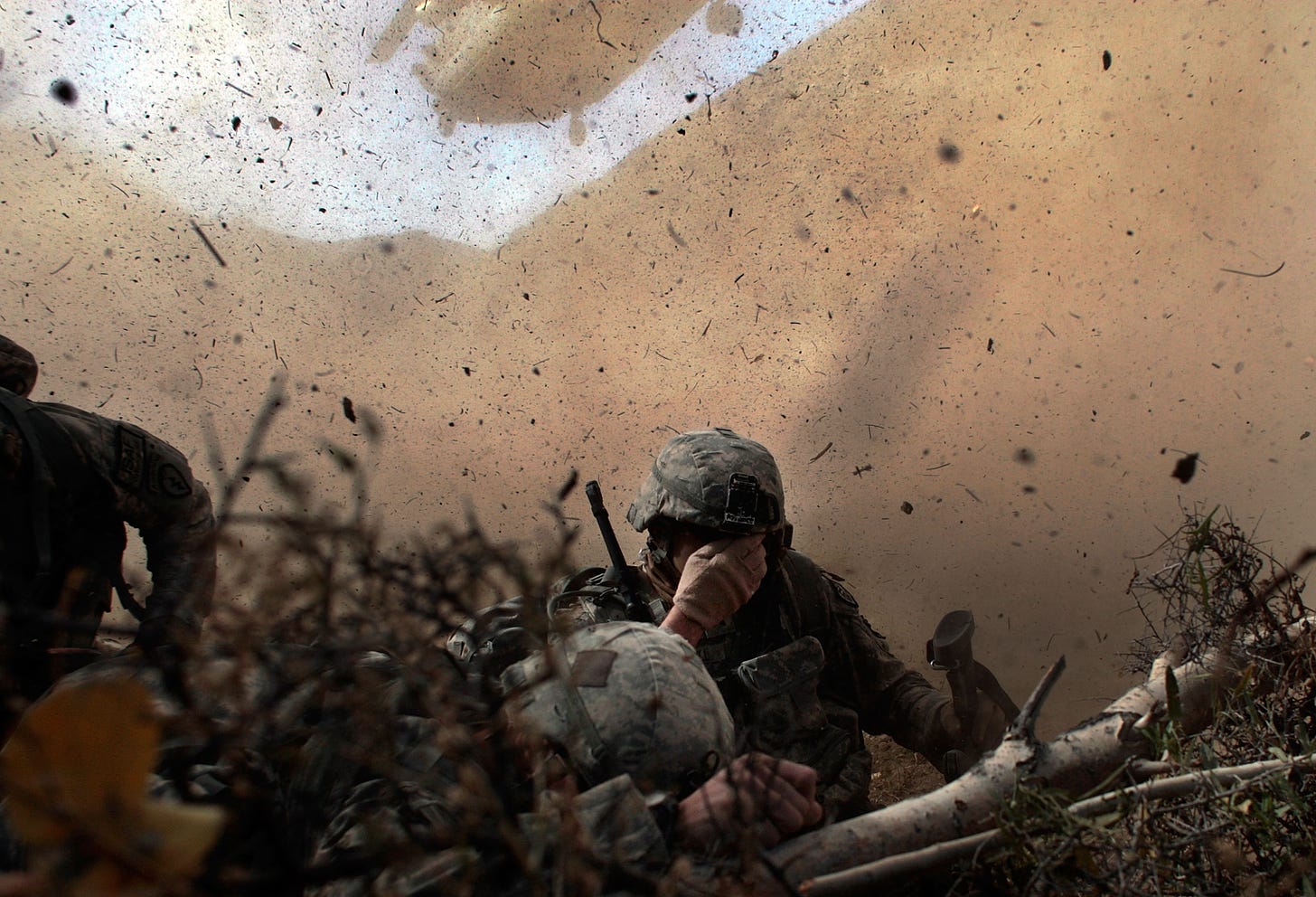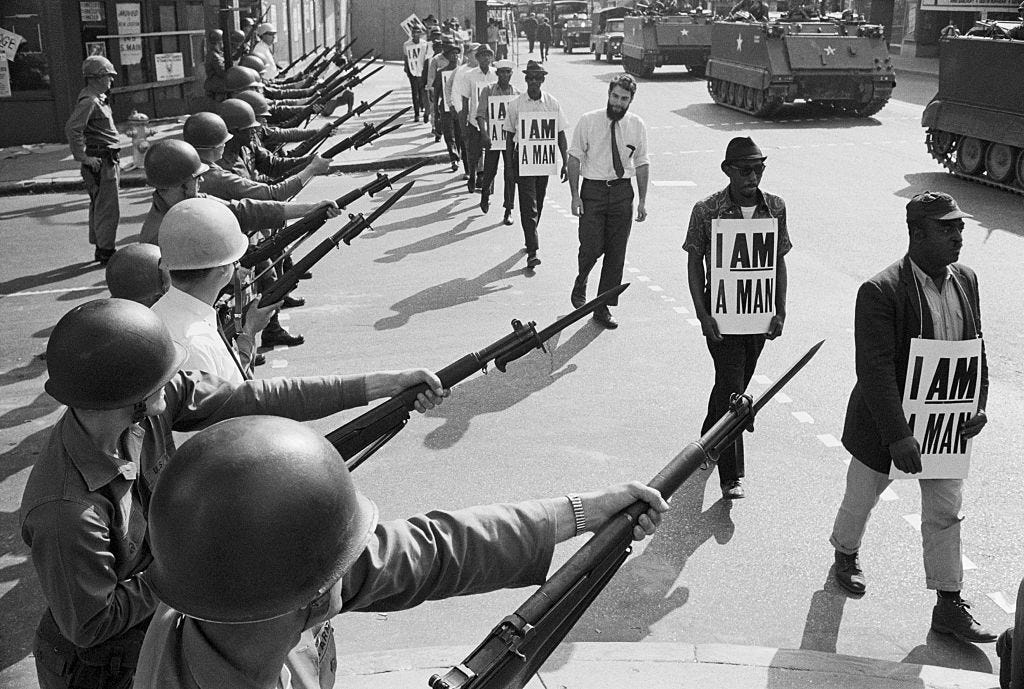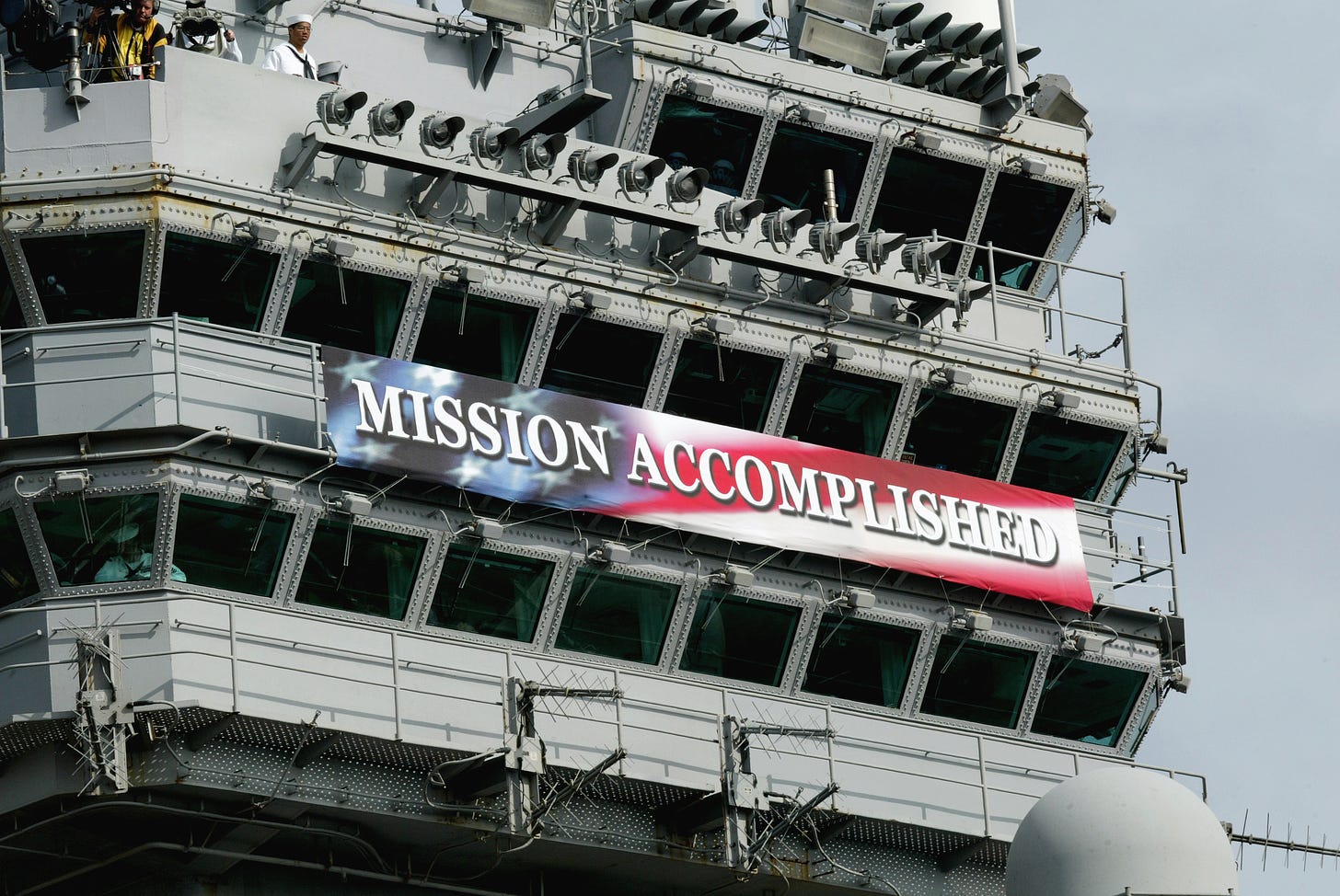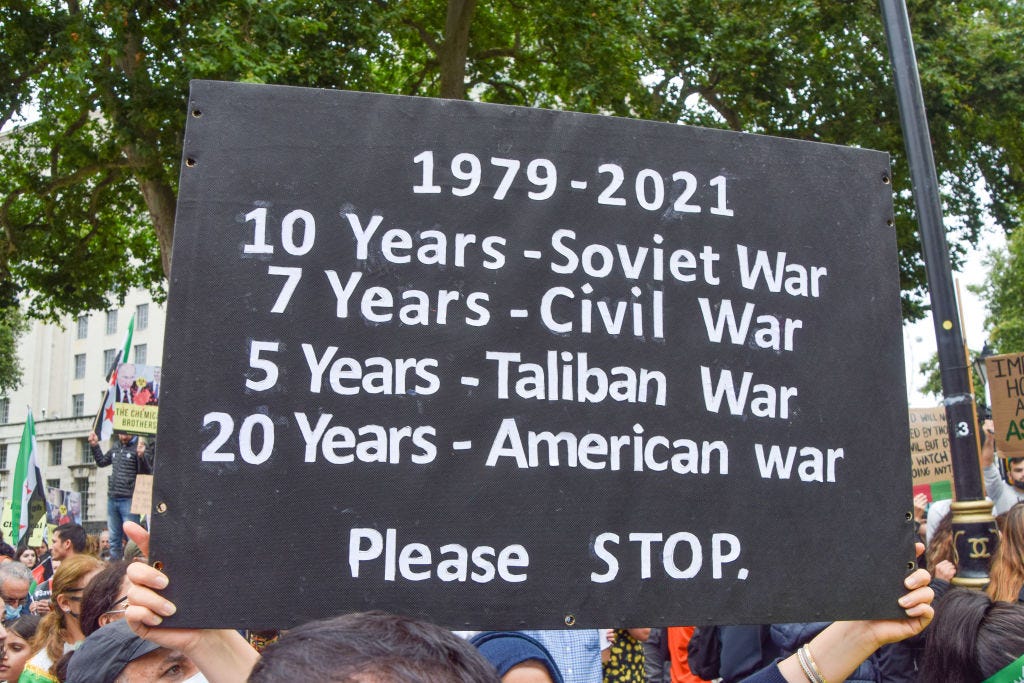
When it comes to history, we are always in the middle of something. The links between the past, the present, and the future should force us to recognize, with humility, that there are no tidy beginnings and endings, no neatly defined chapters, in human affairs. We may wish to put history into clean boxes and eras, but it really doesn’t work that way. History doesn’t march along in unison, it doesn’t rattle along a track, it floods and ebbs and seeps and thunders. It is all connected and to consider it in any other way is to risk missing a lot more than what you’re seeing.
For several days, the world has been focused on the dramatic and tragic scenes out of Afghanistan. The headlines pronounce the chaos of a war in its final act. President Biden, in his address to the nation, stated unequivocally: “We will end America’s longest war after 20 long years of bloodshed.” In a very real sense, this will likely be true. There will be, at some point in the near future, no more American troops in the country. This is a very real ending. But it is not clear how this ending will play out. And then what will come next.
There are many fair and difficult questions that the Biden Administration must answer. We need to have accountability and a reckoning with what went wrong. Why did there not seem to be a contingency plan for such a rapid collapse? Was relocating our Afghan allies and others in danger of Taliban reprisals and violence — such as women’s rights activists, educators, etc. — given enough of a priority? What about tactical decisions like giving up the Bagram Air Base, which might have facilitated evacuation flights? With each passing day, more urgent concerns emerge.
At the same time, it is incumbent on the press and commentators to try to put the current crisis into a broader context. The reality is that Afghanistan has been off the radar for far too long leading up to this point. How much coverage has it gotten over the last several years on front pages and cable news shows? There has been some tremendous and brave reporting, but the nation largely ignored the story of the conflict, understandably preoccupied by events closer to home. And many of the people on television and being quoted in newspapers over the Biden Administration’s failures, the so-called experts, have been wrong time and again about what was happening and what was achievable in Afghanistan, Iraq, and other flashpoints in the so-called Global War on Terror.
We should not dismiss the tragedy of what we are seeing now in Afghanistan, but for all the warranted criticism of the Biden Administration's lack of planning for this moment, can we speak with confidence of what would have happened under other scenarios? Say we had started a large-scale evacuation earlier and then Kabul collapsed quickly. Would that have been blamed on the United States showing it had no confidence in the future of the country? And even now, we do not know how the withdrawal will ultimately unfold, and what will follow. President Biden has a duty to rescue this moment as much as possible. But we cannot forget how we got here, and the role of the previous three presidents —we have far more information and the distance of time to judge their failed actions. You can say we lost the war in Afghanistan when we turned our attention from Al Qaeda to Iraq almost 20 years ago.
Much of the press coverage as Kabul collapsed to the Taliban, which represented less an onslaught than the filling of a vacuum, focused on the immediate imagery and sense of dread over what might happen. This is understandable. There is no doubt that people, good people, people who worked hard for justice and human rights, especially women and girls, are going to suffer. It is also true that the failure of the American mission, which cost trillions of dollars and thousands of American lives, can no longer be denied.
This was definitely the end of something, and something big. But at the same time, as the Biden Administration rushed to start pulling out Americans and Afghan allies, it was also clear that this was the beginning of a new phase, and the middle of much larger currents that are connecting the broad tendrils of a diffuse and elusive narrative.
The origins of the Taliban stretch back to the Soviet occupation of Afghanistan and the Cold War. The Cold War grew out of the Second World War, which was shaped by the failed peace after the First World War. Wars might end technically, at least that’s how they are often taught in history textbooks. 1775-1783. 1861-1865. 1941-1945. And now 2001-2021. But can you talk about the Civil War without talking about Reconstruction, and Jim Crow, and the Civil Rights Movement, and what we are struggling with today on race relations? Can you consider the American Revolution without the Articles of Confederation, the Constitution, and the unresolved matter of slavery, which led to the Civil War (see above)? We like to think that World War II ended with victory parades and kisses at Times Square. But tell that to the soldiers tasked with occupying Japan or those organizing the Berlin Airlift or the massive refugee crisis left in the wake of the conflict. The establishment of the state of Israel was shaped by the Holocaust. The War in Vietnam was shaped by the end of the European colonial system after World War II.
It is an age-old lesson that wars are a lot easier to start than they are to end. And another lesson is that how things appear in the present are rarely how they will appear in hindsight. All that being said, one of the jobs of a journalist is to try to make sense of the present. We cannot shy away from the facts as we are seeing them on the ground in Kabul and throughout Afghanistan. We cannot ignore the politics of what is happening in Washington. We should try to understand what this means for the regional powers in Central Asia like China, Russia, Iran, and Pakistan. We need to listen to the family members of those who died in service in Afghanistan about their feelings with what is taking place. It is valid that Americans are being polled about our feelings at this moment. But we should be very wary of making broad pronouncements or predictions. A favorite saying of mine is that those who live by the crystal ball learn to eat a lot of broken glass.
How many Americans who lived through the horrific battles of World War II would have believed that 20 years after the conflict West Germany and Japan would be two of America’s most stalwart allies against Soviet encroachment? How many GIs fighting in Vietnam would have believed that they could years later grab a Big Mac in Ho Chi Minh City? Conversely, more than 50 years after the Voting Rights Act, how many thought we are back to fighting the same battles of enfranchisement.

History twists and turns but it is not fated. The decisions our leaders make and we make shift the course of the future in ways unseeable at the present. A crisis like we are seeing now in Afghanistan requires a crisis response. That is part of life and the obligations of governance, attending to immediate need. But at the same time it is vital that we not lose sight of the broader narrative. If we choose expediency over prudence, what is popular now over what is needed in the future, we will weaken our nation and its place in the world community. This is what we’ve been doing in Afghanistan for far too long. This is why it was always one more tour, one more initiative supporting a corrupt government, one more year.
We live in an age awash in the technology to tell stories of the moment — cell phone cameras, social media, and global communication that is easy and cheap. If we had had these tools at the end of other wars, we would have seen a lot more chaos and tragedy documented than we remember today. At the same time, we must somehow find a way to bear witness to the sadness of this moment and also still see the big picture. We must understand that we are in the middle of history, with a past we can’t do anything about, and a future that is still ours to shape. The best leaders must operate in the moment and with an eye to what might follow. They must be responsive, and.... steady.
I hope to continue to build a community here on Steady. If you aren’t already a subscriber, please consider signing up to a free or paid subscription. You can also leave a one-time tip to support our work. And if you are already part of our family, please consider sharing this post — and Steady — with others.






Why did we not go into Afghanistan 20 years ago with say 75K troops and focus SOLELY on killing Al Queada and Osama bin Laden? Why did we start a war with the Taliban who did not attack us on 911; and who do not have international ambitions? If we did that; if we were OUT OF THERE in three years at the max, then I believe USA would have been safe and thousands of lives spared and trillions of dollars saved. THERE WAS NO REAL JUSTIFICATION to start a war with the Taliban!! George W Bush used POOR JUDGEMENT!? I do not think that ONE MAN should have that kind of decision making power!! Congress controls the money; but they always say <yes> to a request to go to war because the military generals are urging us to do it! We have got to be smarter!! War should be the LAST TOOL that comes out of the toolbox. And---we should not start unilateral wars with people who did not attack us!! Because of political decisions we are acting stupid! America MUST DO BETTER!!!
"Afghanistan, graveyard of empires." This has been said of many, many others who thought they could wage war there or conquer this country. Hubris, is always at the heart of leaders who think history doesn't apply to them. The problem is; No one is ever held accountable for making terrible, preventable mistakes. GW should've been held accountable for being led into a war in Iraq by those who had hubristic tendencies. He should also have been asked why we were still in Afghanistan when we found out OSBL was not in ToraBora and he said himself nation building was not on his agenda? A true leader takes advice from those around him but doesn't acquiesce to their desires and tends to know a bit about potential consequences. Anyone with a grasp on history would've known we couldn't do anything lasting in this 7th Century country. The British bailed out, the Soviets bailed out, and now it's out turn. It's unfortunately just a fact that we learned nothing from Viet Nam. Finally, the armchair quarterbacks who have no military experience should STFU about this pull out. You don't have any idea behind the thought process of exiting this country that shouldn't have collapsed in 11 days from a military we spent years training. I feel for those (some who are my fellow Veterans) who served there and many who lost lives or had their lives forever changed by wounds seen and unseen. For the usual sacrifices that are not in your control we still have to say that a grateful nation thanks you.